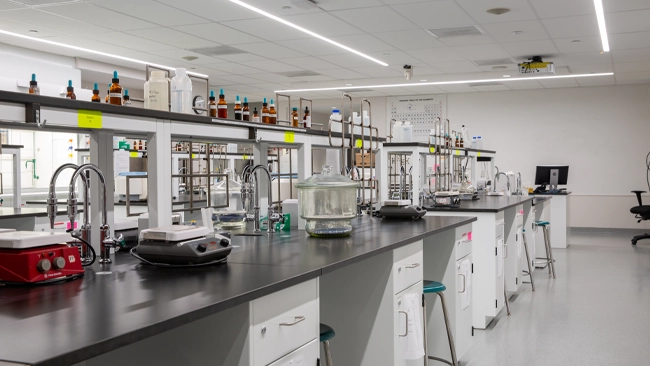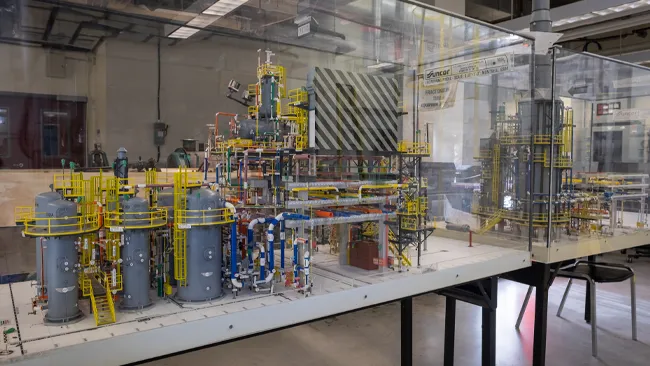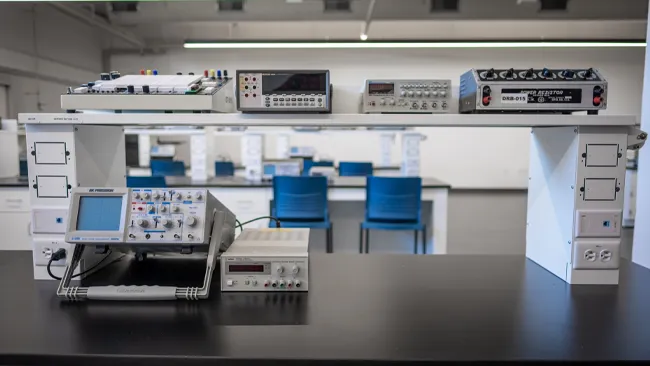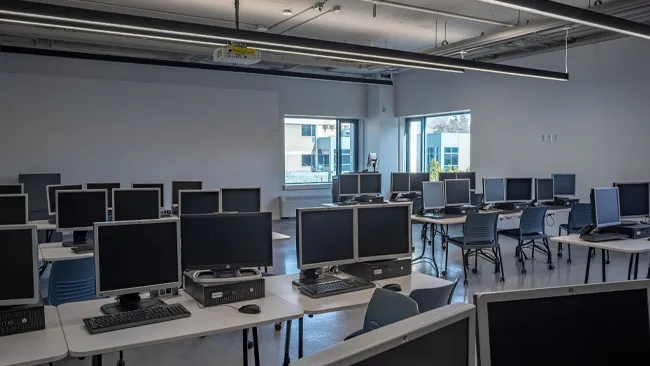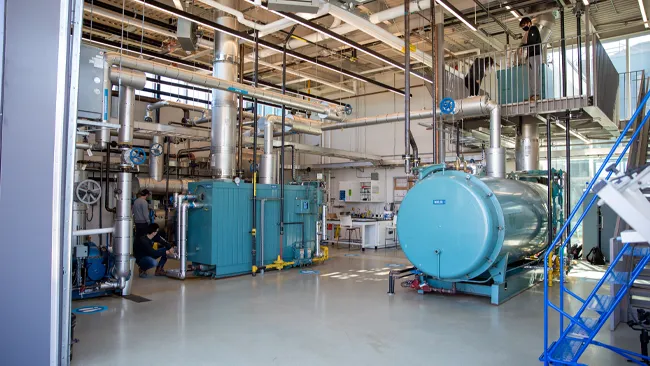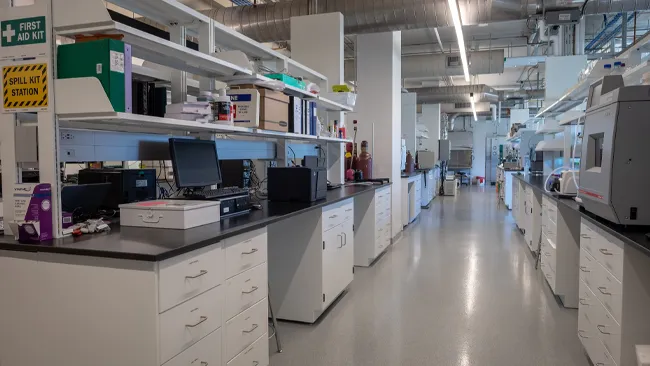

Chemical Production & Power Engineering Technology
Overview
Pathway to a rewarding and lucrative career as an operating engineer or process operator.
An operating engineer or process operator is responsible for controlling and monitoring the operation of industrial equipment and processes to ensure they run safely, efficiently, and effectively. This program at Lambton College has gained national recognition for its ability to train advanced level operators for various industrial sectors, most notably in the petrochemical and energy streams.
Students will train in the Centre of Excellence in Energy & Bio-Industrial Technologies which houses complex lab and pilot plant facilities. The Centre duplicates a real-life manufacturing environment and the technologies developed can easily be scaled-up and transferred to an actual operating unit. The Centre offers technology labs and infrastructure to support learning and research in next-generation technologies in collaboration with industry.
Experiential learning is emphasized through the program’s unique co-op model, which is designed to support the employment needs of industry year-round. Students also participate in ongoing projects designed to cultivate teamwork, communication, interpersonal, and problem solving skills that can be used in future workplace scenarios when analyzing operating problems in a plant environment.
OACETT recognizes this program as meeting all the academic requirements for certification in the Certified Engineering Technology (CET) category.
Admission Requirements
O.S.S.D. or equivalent with:
- Grade 12 English C or U
- Grade 12 Mathematics C or U
- Grade 11 or 12 Chemistry C or U
-or-
Grade 11 or 12 Physics C or U
(both recommended, only one required)
Mature Student Assessment for this program is available in the subject of English for the purpose of demonstrating proficiency in this required admission subject. For all other admission requirements, applicants must complete the required course(s) as listed above. For more information, please contact counselling@lambtoncollege.ca. Review the Mature Student Admission process.
Academic admission requirements can be obtained through Academic Upgrading and the Pre-Technology & Trades (PTEC) program at Lambton College.
Grade 12 Mathematics Requirement
Grade 12 Mathematics for College Technology or any grade 12U mathematics is recommended; Grade 12 Foundations for College Mathematics (MAP4C) minimum final grade is 60%. If the program is highly competitive, students with Grade 12 Mathematics for College Technology or any Grade 12U mathematics will be given preference.
Emergency Preparedness
Program Collaboration
Graduates may be required or have an option to participate as a member of the first response team in addition to other daily duties.
Lambton College collaborates with its Fire School to provide CPET students with hands-on fire training as part of the core curriculum. We're one of the first post-secondary institutions in Ontario to include this essential training as part of a Power Engineering program.

Costs
- Year 1 $6,666.90
- Year 2 $6,895.75
- Year 3 $6,834.90
Please Note: These fees apply to the 2024-2025 academic year and are subject to change. Fees do not include books (unless specifically noted), supplies or living costs.
Co-op Terms
The costs per year listed don't account for the co-op group you may be assigned to. Depending on whether you're in Group A or Group B, you annual tuition may be broken out into term payments. For exact fee amounts, it is always best to log in to mylambton.ca to check your balance.
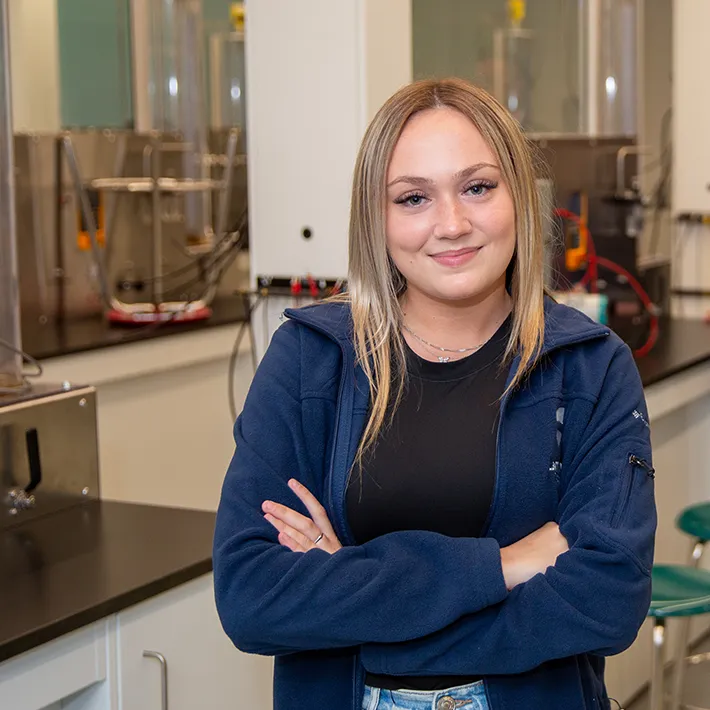
Hannah's Story
'The CPET program at Lambton College provides practical training for working in industry because of the hands on experience and simulation labs that prepares you for different scenarios that may arise in the workforce.”
Additional Fees
-
Lab Coat$40.00
-
Calculator$40.00
-
Safety Boots$150.00
-
Safety Glasses$20.00
-
4th Class Power Engineering Textbooks$1,250.00
Scholarships Available
There are 17 scholarships available for this program, with a total value of $14,850!
Technology Requirements
In order to keep pace with the requirements of each and every course in your program, Lambton College requires that each student have access to a laptop while studying at our college.
Labs & Equipment
Courses
General Chemistry I
This course provides an introduction to the fundamentals of chemistry through the integration of chemical theory and laboratory experiments. The theory portion includes the mole concept, gas laws, and electronic structure of atoms, the Periodic Table, chemical bonding and molecular structure. The laboratory portion is designed to apply the above theoretical concepts while developing basic skills of manipulation and careful observation through experiments in quantitative and qualitative analysis.
Critical Thinking & Writing
In this writing course, students respond to current issues and news articles via various styles of paragraphs and essays. Students practice thinking critically and organize and hone their writing to ensure clarity and correctness in their messages. Students explore different perspectives, and through synthesis, analysis, and response, strive for clarity of message and diplomatic expression of opinion based on fact. One of the pillars of Lambton College is a commitment to sustainability and equity, diversity, and inclusion, including Indigenization of the curriculum; where appropriate, readings in this course will reflect this commitment. Critical Thinking and Writing lays the foundation for a subsequent research-writing course.
Job Search & Success
This course provides student with skills and knowledge to help support their career search and succeed in the workplace. Students align their personal skill set and goals to guide them on their career paths. They will learn how to effectively conduct a job search, build a professional and well-tailored resume and cover letter, and develop and practice interview techniques. Students will also develop their personal brand to help support effective career networking and aid in their job search. Teamwork and collaboration in the workplace are also discussed. Self-reflection is used to inspire insight and support their professional career journey.
Mathematics for Technology I
This course reviews and develops concepts in algebra, trigonometry, complex numbers, and vectors with technical applications.
Operating Engineering Studies I
This is an introductory course in Operating Engineering, which will give a general overview of process equipment, systems, and techniques. The codes and regulations that apply to Operating Engineering will be discussed. Emphasis will be placed on safety concerns such as WHMIS, plant safety, protective equipment, fire protection and extinguishing equipment, and environmental impacts. Process drawing fundamentals, basic process equipment such as steam traps, relief valves, piping systems, and lubrication systems will be studied.
Operating Engineering Calculations
This course aims to provide students of engineering technology disciplines with a solid foundation in mechanics for process operation and thermodynamics for steam plant operation, to the level required for 4th Class Operating Engineer Certification by Technical Standards and Safety Authority. The emphasis is on the understanding of the theory and applying it to solve practical problems of processes and plant.
General Chemistry II
This course will provide an introduction to organic chemistry and selected common functional groups in that field, some of which are important monomers in biological polymers and plastics. Students will also explore physicochemical properties of solutions, such as gas solubility, colligative properties, acidity and osmotic pressure. A large portion of the course investigates the chemistry of reaction processes, including chemical equilibria and the energy balance of chemical reactions as it relates to the flow of heat energy (calorimetry) and electric energy (electrochemistry). Fundamental processes involving nuclear chemistry and the chemistry and control of process water are introduced. Many of these concepts are supported and reinforced in the laboratory portion of the course.
Operating Engineering Studies - Boilers
This course covers theoretical knowledge required to understand the systems, processes, and operation of various types of power plants, and helps prepares the student for the Power Engineering Certification Examinations. Topics covered include combustion, piping, types of plants, instrumentation, boiler construction, parts and fittings, boiler operation and control, including legislation and regulations.
Mathematics for Technology II
This course contains elements of algebra, and introduces the concept of functions including graphing. It also introduces differential and integral calculus with basic applications.
Health & Safety for Industrial Processes
The graduate of this course will have a good understanding of safety aspects of the law, the legal responsibilities of the workplace, and his/her own legal rights and responsibilities, as well as work processes and procedures being used in present-day industry. This course will give them a basic understanding of the Occupational Health and Safety Act and its associated Regulations, and an understanding of health and safety issues in an industrial setting.
Electrical Circuits I
It is an introductory course in electricity consisting of fundamental electric principles together with an analysis of simple electric circuits. Emphasis throughout the course is on problem solving. Laboratory exercises complement the material covered in class.
Communications for Technology
Technical writing differs from most student writing; therefore, it is necessary for students to learn the structure, nuances, and style of technical writing to be successful in completing labs, summaries, and reports. Through research writing and documentation, and through oral presentations, successful students will gain important transferrable skills that provide the basis for technical communication required in their other coursework and the workplace.
Co-op Work Term (8 Months)
Co-operative education provides students with the opportunity to apply classroom learning to the workplace, undertake career sampling and gain valuable work experience that may assist students in leveraging employment after graduation.
Refrigeration Theory & Systems I
This course covers the thermodynamics of refrigeration systems, classes of refrigerants and a thorough understanding of both vapour compression and absorption refrigeration systems. Compressors and heat transfer equipment as applied to refrigeration systems are covered. The operation, safety, controls, and maintenance of these systems are included, and applied to refrigeration trainer systems on site.
Operating Engineering Studies - Equipment
Operating equipment pertaining to various types of Industries will be discussed throughout this course. It offers a practical approach to pumps, air compressors, steam turbines and engines, gas turbines, and internal combustions engines. Their principles of operation, classifications, components, basic maintenance and troubleshooting will be explored and investigated through both theory and hands-on applications. This course also offers an overview of an array of process systems, such as flares and different utility systems, which rely on industrial equipment to operate.
Mechanical Practices for Operating Engineers
This course is intended to develop the introductory mechanical skills required by an Operating Engineer and those who work in a process-related position. Certain types of jobs in the field of Operating Engineering will require varying levels of hands-on mechanical skills. Students in this course will develop an understanding of energy isolation, various types of fluid conductors, gasket selection and installation techniques, blank and blind usage, pressure testing, shaft alignment, fire extinguisher usage, compressor fundamentals, and procedures for rigging, hoisting, and proper communication.
Instrumentaiton for Plant Operations I
This is an intensive introductory course in instrumentation for those going into the plant operations or power engineering fields. Students will develop an understanding of instrumentation terminology, symbology, and elements of instrument systems. Methods of measurement and installation aspects of devices for pressure, level, flow, and temperature measurement will be covered in detail. Boiler instrumentation and introductory controls are highlighted for the Operating Engineering curriculum. A series of laboratory experiments will illustrate the operation and the principles of calibration of conventional and smart field instrumentation.
Operating Engineering Studies - HVAC
This course focuses on heating, ventilation, air conditioning systems, and building services. Low pressure steam and hot water heating systems, including their operations, controls, and basic maintenance, are explored. Various HVAC layouts are examined, as well as humidification systems, heat recovery, and heat gain/loss by buildings. An introduction to building lighting, water, and sanitary sewer systems is included.
General Education Elective (Select 2) *
Co-op Work Term (8 Months)
Co-operative education provides students with the opportunity to apply classroom learning to the workplace, undertake career sampling and gain valuable work experience that may assist students in leveraging employment after graduation.
Introduction to Industrial Chemical Processes
This course, specifically designed to support students involved in Process Technology and related technology programs, examines the development of industrial complexes, refining and petrochemical and petroleum products, plastics and rubbers (polymers), and the manufacture of ammonia, steel and aluminum. Basic principles of industrial chemistry process units, and energy production, with particular focus on nuclear power, are reviewed and applied to typical processes drawn from a variety of industry sectors. This course also includes a brief overview of the general factors which lead to the development of a petrochemical complex, with particular emphasis on the history and subsequent development of the Sarnia-Lambton industrial complex.
Operating Engineering Studies - Electrical
This course will introduce the learner to the fundamentals of electric machines and transformers used in process and manufacturing industries. Topics will include magnetic principles and circuits, DC and AC motors and generators, transformers, power distribution systems, and control circuits of electrical machines This course will provide the student with sufficient comprehension of electrical power systems and devices such that the learner can function with confidence when working in this environment.
Introduction to BIofuels & Bio-Based Chemicals
Unlike petroleum, biomass (plant matter) is a renewable resource that can be used to make fuels and chemicals. This course will introduce students to energy crops such as corn and switchgrass and the use of agricultural waste as a source of biofuels and bio-based chemicals. Students will also learn about biomass pre-processing techniques such as materials handling, drying and grinding. This course will also introduce students to the chemistry principles underlying the production of biofuels and bio-based chemicals.
Piping & Mechanical Systems
This is an advanced level course in materials and mechanical systems. Metals and non-metals materials are studied and the science of corrosion, including protection methods. Piping and pressure vessel materials, codes and calculations, connections, supports and insulation designs and methods are covered. A study of steam traps and piping systems to reduce water hammer is made. Welding processes, techniques, certification and testing are studied.
Advanced Process Operations I
This course expands upon process equipment and instrumentation knowledge to begin the exploration of plant systems and their remote operations. The students will operate multiple process simulations designed to familiarize them with the console responsibilities of process operations and how the human-machine interface (HMI) functions. A detailed understanding of Process & Instrument Drawings (P&IDs), Process Flow Diagrams (PFDs), and Plot Plan drawings will also be developed. Instrumentation safety systems, including hazardous area designations and protective systems, will be discussed to provide a thorough understanding of the overall systems and their components.
Statistics for Technology
This course contains descriptive statistics, basic probability, regression analysis, and probability distributions, including the binomial distribution and normal distribution. The statistical ideas of sampling and confidence intervals are introduced, and applications of probability and statistics are studied, such as reliability and statistical process control.
General Education Elective
Co-op Work Term (8 Months)
Co-operative education provides students with the opportunity to apply classroom learning to the workplace, undertake career sampling and gain valuable work experience that may assist students in leveraging employment after graduation.
Chemical Engineering Operations & Calculations I
This course will introduce students to the principles and practices underlying the design and operation of units in industrial process plant. Two major areas of unit operations will be examined. They are viz., fluid mechanics and heat transfer. In fluid mechanics, the topics are: fluid statics, fluid dynamics concentrating in the area of pipe flows, and the transportation and metering of fluids. In heat transfer, the topics are: heat transfer by conduction and thermal insulation, heat flow in heat exchangers, heat transfer by convection covering forced convection in both internal flows and external flows, and natural convection.
Process Control Systems
This course consists of an introduction to process control and control systems. Topics include process characteristics, On/Off control, PI, PD, PID controls, and PID controllers tuning. Applications are presented in each case. The laboratory portion of the course allows the student to operate many types of loop control systems with the primary emphasis on controller tuning. It will focus on the related process control functions required to produce a given product. Many Chemical Production graduates find employment in the unit operations area of process plants, while others will need to have an understanding of process control to make effective decisions with respect to various analytical or research problems. This course is designed to introduce these students to process control problems, and the various types of control configurations they will encounter in the process industries. Methods of controller tuning will also be studied.
Process Stream Analysis
This course introduces the student to process analyzers, concentrating on the application, operation, calibration and routine maintenance of analyzer systems. Chemical production personnel are responsible for the monitoring and control of industrial processes. Production personnel rely on on-line process analyzers to ensure and confirm that product quality targets are being met and maximum process efficiencies are achieved. Environmental analyzers are also utilized to ensure worker safety is secured and governmental regulations are met. Increasingly, production personnel are expected to perform general maintenance on analytical systems as well as perform routine calibration checks.
Advanced Process Operations II
This course will cover petroleum refining principles and processes in detail. This course will concentrate on building skills in plant operating techniques and strategies. Distillation and crude processing units will be studied from both a process knowledge viewpoint, and an operating technique viewpoint. Two types of distillation units will be studied; the first being a methanol-water unit using a glass pilot plant facility, and the second being a crude distillation unit and debutanizer/depropanizer using the process simulation laboratory. Statistical Process Control (SPC) and its application to process industries will also be a topic of study.
Production of Biofuels and Bio-Based Chemicals
This course is a follow-up to BIO 4614. BIO 4614 introduced students to the theoretical principles involved in the production of biofuel and bio-based chemicals. This course trains students in the practical operation of the biodiesel reactor and the mini-ethanol plant that are located in Lambton College
Co-op Work Term (8 Months)
Co-operative education provides students with the opportunity to apply classroom learning to the workplace, undertake career sampling and gain valuable work experience that may assist students in leveraging employment after graduation.
Chemcial Engineering Operations & Calculations II
This course introduces students to the principles underlying the design and operations of mass-transfer equipment of the processes of evaporation, distillation, absorption and striping, and extraction.
Advanced Control Applications
A continuation of ICS 5315, students will study advanced aspects of analog process-control systems. The topics of study include 1 - Distributed Control Systems relating to: Components, Functions, Software and Basic Control Strategies; 2 - Feedforward control; 3 - Instrumentation Scaling; 4 - Process Control Constraints; 5 - Control Loop Interactions in Processes, and 6 - Adaptive and Multi Variable Control. This course will prepare students with the skills to learn complex control strategies in their industry and also reveal how the systems function.
Advanced Process Operations III
This course introduces the essential elements of reaction engineering in chemical production processes. The core of the course will be focused on chemical thermodynamics, chemical kinetics, chemical reactors, and material balances in physical and chemical processes. For practical training students will learn the technique of operating industrial processes that involve chemical reactions by means of dynamic simulation.
Environemntal Management
Leading-edge process operations are successful when the end product is produced safely and in an environmentally sound way. Modern technologists in the process industry are called on to carry out a wide range of tasks including environmental source control. This course is designed to develop a basic understanding of industrial process impact on environment, strategies of environmental protection as well as to appreciate responsibilities of process operators towards environment. The course emphasizes the importance of ecosystem concepts, societal demands, communication and environmental laws as they apply to chemical production facilities.
Capstone Project
This project-based course will enable students to apply the knowledge that they have gained during the last 7 semesters to design and/or build and/or operate chemical process equipment as part of a semester-long project. Each team of students will select 1 of several such projects and start working on them by using their technical skills and project management (PM) techniques. Therefore, they will gain teamwork and technical presentation skills and acquire practical hands-on experience while working on a project that resembles the real-world projects that they will be doing during their future industrial careers. Students will also write a final exam that is modeled after the Certified Associate in Project Management (CAPM) examination. It is expected that this will inspire several students to write the CAPM exam and get a CAPM certificate that will help them gain a foothold in the management side of things, in industry.
*General Education Courses
The recommended General Education Courses in Terms 3 and 4 are:
- HIN-3303 Human Interaction
- SUS-1003 Introduction to Sustainable Development
Contact
Program Information
Applied Science, Engineering Technology & Trades
After Graduation
Employment Opportunities
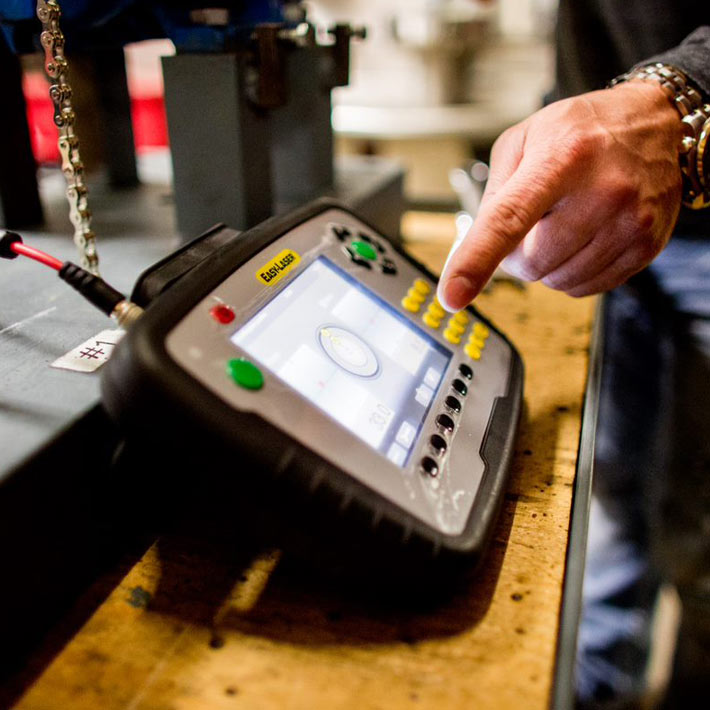
The majority of our graduates enter into various industries as Operating Engineers and Process Operators. Industries include refining and chemical process, power generation, steel production, pulp and paper, food processing, and other industrial operating or manufacturing industries. Upon completion of the program and necessary work experience, graduates have the opportunity to move into positions including, but not limited to, unit supervision and shutdown planning.
Accreditations & Certifications
Operating Engineering Certification
Upon successful completion of the first three terms of this program, students will be eligible for a nine-month Qualifying Experience Time (QET) reduction toward their 4th Class Operating Engineering Certification.
TSSA 4th Class Certification Requirements
- Obtaining a TSSA 4th Class ticket requires passing two provincial exams and normally 12 months of QET.
- Successful completion of the first three academic terms of the program provides students with nine months of QET reduction.
- The co-op opportunity gives the students the opportunity to obtain the remaining three months of QET reduction to complete their 4th Class ticket.
- The provincial tests require additional fees paid for by the students.
Pathways
Transfer to Programs within Ontario
- Bachelor of Engineering - minimum GPA of 3.0
- Bachelor of Technology - Manufacturing Engineering Technology
Want to see more Ontario transfers? Visit ONTransfer.ca.
Transfer to Programs outside of Ontario
Specific Program Requirements
Please visit the individual institute websites for specific admission requirements.
Power Engineering Technology and Chemical Production & Power Engineering Technology - Pathways
Co-op
About Co-op
Students in this program have the opportunity to gain valuable work experience by applying classroom learning during co-op experiences.
Learn more about co-op terms and the roles and responsibilities of students and co-op advisors.
Chemical Production & Power Engineering Technology - Co- op Opportunities
Students Unable to Acquire Co-op
Students who are unable to acquire a co-op position will still be allowed to continue through the program the next academic term or graduate from the Chemical Production & Power Engineering Technician Diploma program.
Securing an approved co-op position is one of the requirements for obtaining the TSSA 4th Class Certification.
More Information
Women in Technology & Trades
Discover how Lambton College's Women in Technology & Trades (WiTT) group is empowering women to excel in technology and trades.
Visit our WiTT page for more information on mentorship opportunities, events, and resources designed to support your journey in these dynamic fields.
Learn More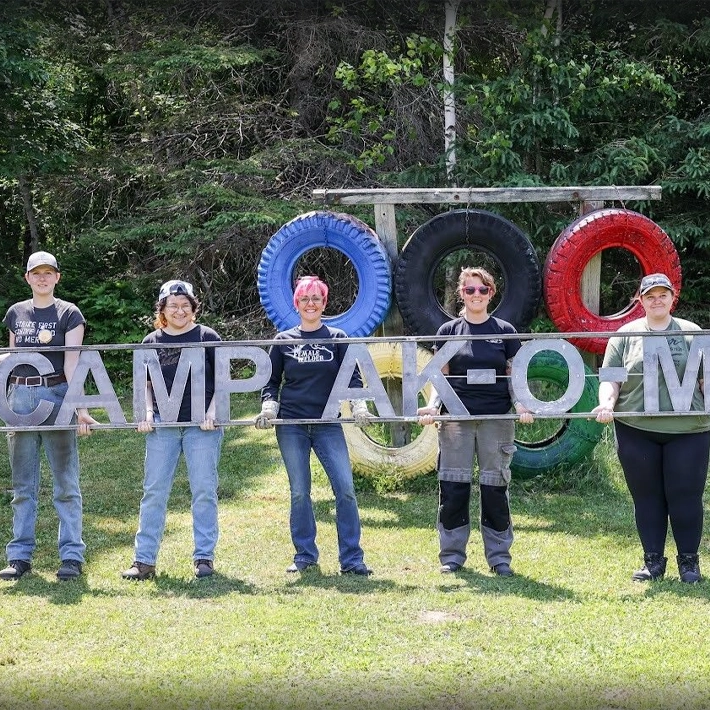
Power Engineering Technology - Women in Technology
Skill Demands
Students are required to have both fine and gross motor control to operate various pieces of equipment.
Students should possess adequate vision in order to read instruments and take measurements, and must be capable of climbing vertical ladders and walking platforms with open gratings.
Some students with disabilities may require academic accommodations to equalize opportunities to meet the academic demands of this program or a course within it.
Technology Requirements
It is recommended that students purchase a laptop with a Windows operating system.
Internet Speed Requirements
For best performance for students learning remotely, an internet connection with a minimum of 40 Mbps download and 10 Mbps upload speed is recommended in order to effectively use video conferencing and remote lecture delivery software as well as, other online resources remotely. Due to the large area over which students may be dispersed, we are unable to recommend a specific provider, so you will need to inquire around your area to find one that best suits your needs.
Minimum Laptop Requirements
In order to access the internet and virtually-delivered software and courseware, student laptops should include the following at a minimum. By meeting the following specifications, students will be equipped to access software and courseware on their laptop through the internet:
- Intel i5 8th Gen Processor or equivalent
- 16 GB of RAM (with a minimum of 8 GB)
- 100 GB HDD or more
- HD Graphics
- Webcam with a microphone
- Wireless 802.11n/ac 5ghz capable
- Windows Operating System (Windows 11)
Please note that Chromebooks and MacBooks may not support all software required for your program; students should verify compatibility with their professors.
Software
To ensure students are getting the most our of their classroom experience, some software will be required.
Lambton College has made this software easily accessible online. Students can leverage our Microsoft Office 365 software packages and services. In addition, much of the software you require for your courses will be available on demand for use on any device - on or off campus.
